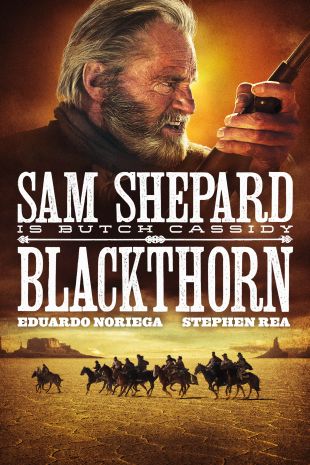
In its early seasons, Saturday Night Live used to have a recurring sketch called What If?, which took the form of an absurd children's television show in which kids wrote in with questions that turned key moments in history on their ear: The cast tried to show us what might have happened if, say, Eleanor Roosevelt were able to fly, or if Spartacus had access to a small airplane. This is a narrative trick that has popped up in the movies plenty of times over the years, as films imagined what would have happened if H.G. Wells had a working time machine (Time After Time) or if Albert Einstein had a date with Marilyn Monroe (Insignificance). Spanish director Mateo Gil confirms that the What If? scenario can be the basis of an intelligent, thoughtful, and entertaining drama with Blackthorn, a tale that rewrites the last days of Butch Cassidy and gives Sam Shepard a platform for one of the most-engaging performances of his career.
Blackthorn opens with a title card that reminds us of what most folks who've seen the classic Butch Cassidy and the Sundance Kid surely remember -- that in 1908, after making their way to South America, Butch and Sundance were killed in an ambush led by American lawmen and the Bolivian army. However, the titles go on to mention that some believe that the two men shot down that day were not actually Butch and Sundance, and we're soon introduced to James Blackthorn (Shepard), an American in his late sixties who lives on a small farm in Bolivia, where he breeds horses. Blackthorn often writes to a nephew in the United States, and he feels the years catching up with him and believes it's time to return home. Blackthorn is, of course, the fugitive Butch Cassidy, who has been living quietly in the mountains after witnessing the death of his best friend Sundance (Padraic Delaney) and watching the woman he loved, Etta Place (Dominique McElligott), return to the States to raise her son. After drawing his savings from the bank, selling some horses and winning a high-stakes poker game, Blackthorn has six thousand dollars in his saddle bags as he returns home to pack following a visit to the city. However, Blackthorn runs afoul of Eduardo Apodaca (Eduardo Noriega), a Spaniard who mistakes him for a bandit on his trail. A skirmish causes Blackthorn's horse to run off with his bankroll, but after Blackthorn saves Apodaca's life, the Spaniard reveals a secret -- he used to work as an engineer for a wealthy but corrupt mining tycoon in Bolivia, and he's hidden $50,000 in British currency in a mine shaft. Blackthorn is wary, but tags along and discovers Apodaca is good to his word and is willing to help him recover the cash in exchange for a 50/50 split. However, a ragged but determined group of bandits are on their trail, and it doesn't take long for Apodaca to suspect that he's not traveling with an ordinary horse breeder.
Blackthorn is clearly not a sequel to 1969's Butch Cassidy and the Sundance Kid, and it doesn't assume the audience is familiar with that film (occasional flashbacks remind us about the main character's salad days and the love triangle between Butch, Sundance, and Etta), but in a very real way, it absorbs the mood and flavor of the earlier movie, lets it age for 20 years, and then offers us a look at a man who not only isn't dead but isn't prepared to lie down just yet. Blackthorn also isn't as witty as the 1969 picture (which was as much a comedy as a Western), but Sam Shepard manages to be just as charming and resourceful as Paul Newman was when he played Cassidy. With a grey beard and a full array of scars and wrinkles (doubtless enhanced by the film's makeup team), Shepard looks noticeably older than his 67 years in Blackthorn, but Butch's mind seems as sharp as ever, and Shepard gives his performance a weathered but lively texture that reveals strength, wiles, and imagination. This is among the very best and most-effective performances Shepard has ever given onscreen, and he steals this movie from a very capable supporting cast, including Noriega as his uninvited sidekick Apodaca, Stephen Rea as a Pinkerton agent with an old score to settle with Cassidy, and Nikolaj Coster-Waldau as the younger Butch in the flashback sequences (Dominique McElligott, who also dominates the flashbacks, provides Etta with a great deal more backbone than she had in the 1969 film, and the character is interesting enough to have merited more screen time). Director Mateo Gil is best known as a screenwriter, having penned the scripts for The Sea Inside and Open Your Eyes, but he's certainly learned what to do behind the camera for Blackthorn, his second theatrical feature. Visually, Gil captures the beauty of Bolivia's open spaces with clean, bold framing (cinematographer Juan Ruiz-Anchia gives the film a subtle but creative color palate and sharp, evocative images), and he moves the film along with the grace and force of a classic Western, albeit one that takes place in South America. One of the most-familiar elements of the revisionist Westerns of the late 1960s and '70s was the disappearance of the American West and the men who thrived in its lawless days, but in Blackthorn, Butch Cassidy is not only still around in 1927, he's found a way to make his own personal moral code work a long way from home; the result is a Western that's both unique and familiar in its approach. Director Gil and leading man Shepard have hit just the right balance between revisionism and classicism, and Blackthorn is one of the year's most-pleasant surprises.
